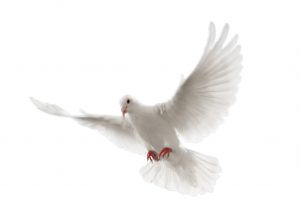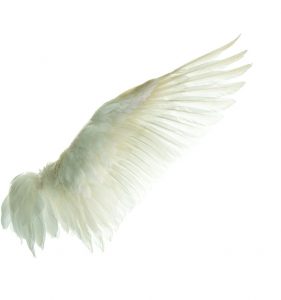×


We have detected your country as:
Please click here to go to the USA website or select another country from the dropdown list.
by: Terry Mason, Deputy–International Development

Photo: Jeannette van der Merwe/ Bridgesforpeace.com
Did you have a positive childhood experience that continues to impact your life? When I was a tender, impressionable eight-year-old boy, my parents worked at a college. A graduate student in biology took an interest in me and my twin brother. He would often take us out in the springtime to check bird nests and do field research. I was hooked; we saw God’s handiwork up close and personal as we watched the eggs hatch and baby birds develop. I bought my first pair of binoculars at a household sale and have enjoyed watching and studying birds ever since.
Combining my love for the Word of God and enjoyment of the beautiful birds that He created only seemed natural. Over the years I have found it interesting, even deeply insightful, to look at references to birds in Scripture. It is wings that make birds unique in the animal kingdom. Let’s look at some of the many spiritual lessons that we can learn from the birds, especially their wings, which are mentioned so often in the Word. After all, in Matthew 6:26 Yeshua (Jesus) admonished us to do just that, “Look at the birds of the air, for they neither sow nor reap nor gather into barns; yet your heavenly Father feeds them. Are you not of more value than they?” (emphasis added).
 Wings are a safety asset for birds. In Psalm 55, King David looked at the birds and wished for the asset of wings in the midst of his adversaries when he cried out, “Fearfulness and trembling have come upon me, and horror has overwhelmed me. So I said, ‘Oh, that I had wings like a dove! I would fly away and be at rest. Indeed, I would wander far off, and remain in the wilderness. Selah’” (Ps. 55:5–7). One of the greatest benefits of having wings is that a bird can quickly spread them and avoid danger, flying high above and far away from any perceived threat. In fact, that is how God described His intervention for the Israelites when He brought them out of slavery in Egypt. “You have seen what I did to the Egyptians, and how I bore you on eagles’ wings and brought you to Myself” (Exod. 19:4). In his classic commentary Matthew Henry states, “It denotes great speed. God not only came upon the wing for their deliverance (when the set time was come, he rode on a cherub, and did fly), but he hastened them out, as it were, upon the wing. He did it also with great ease, with the strength as well as with the swiftness of an eagle.”
Wings are a safety asset for birds. In Psalm 55, King David looked at the birds and wished for the asset of wings in the midst of his adversaries when he cried out, “Fearfulness and trembling have come upon me, and horror has overwhelmed me. So I said, ‘Oh, that I had wings like a dove! I would fly away and be at rest. Indeed, I would wander far off, and remain in the wilderness. Selah’” (Ps. 55:5–7). One of the greatest benefits of having wings is that a bird can quickly spread them and avoid danger, flying high above and far away from any perceived threat. In fact, that is how God described His intervention for the Israelites when He brought them out of slavery in Egypt. “You have seen what I did to the Egyptians, and how I bore you on eagles’ wings and brought you to Myself” (Exod. 19:4). In his classic commentary Matthew Henry states, “It denotes great speed. God not only came upon the wing for their deliverance (when the set time was come, he rode on a cherub, and did fly), but he hastened them out, as it were, upon the wing. He did it also with great ease, with the strength as well as with the swiftness of an eagle.”
Due to its ability to fly very high and nest on inaccessible cliffs the eagle had no known predators during biblical times. Both Obadiah and Jeremiah used this imagery to prophesy doom against Israel’s enemies, the Edomites, that they could not escape God’s reach. “‘Your fierceness has deceived you, the pride of your heart, O you who dwell in the clefts of the rock, who hold the height of the hill! Though you make your nest as high as the eagle, I will bring you down from there,’ says the LORD” (Jer. 49:16). “‘Though you ascend as high as the eagle, and though you set your nest among the stars, from there I will bring you down,’ says the LORD” (Obad. 1:4).
Isaiah 31:5 gives a vivid word picture of the fierceness parent birds often show when defending their young likening it to God’s defense of Jerusalem. “Like birds flying about, so will the LORD of hosts defend Jerusalem. Defending, He will also deliver it; passing over, He will preserve it.” Most species of birds are bold and aggressive in defense of their nests and nestlings. If a perceived threat approaches too closely the parent birds often dive bomb the intruder to try and drive it away. Often they will use their strong bills or feet to attack.
When we visited a nesting island in the North Atlantic, the guide gave each member of our landing party a long stick before we left the boat and told everyone to hold it above our heads. He explained that the terns would attack the top of the stick rather than our heads. Once we were on shore walking, one lady felt funny carrying a stick vertically over her head and decided to put her stick down. Almost immediately a parent tern swooped down and took a chunk of flesh out of her scalp with its strong beak. With birds of prey the consequences can be even more severe as they use their powerful talons to inflict pain and drive the threat away. The next time you see a parent bird aggressively defending its nest, remember that is how God is portrayed in Scripture as He defends Jerusalem, His holy city. And He will do the same to protect us, His children.
Indeed, we are commanded in Psalm 122:6 to pray for the peace of Jerusalem and, in Isaiah, we are told that we should not allow the Lord to forget His promise to defend Jerusalem. Through our faithful, fervent prayers we can remind God to swoop down as it were and defend Jerusalem. “I have set watchmen on your walls, O Jerusalem; they shall never hold their peace day or night. You who make mention of the LORD, do not keep silent, and give Him no rest till He establishes and till He makes Jerusalem a praise in the earth. The LORD has sworn by His right hand and by the arm of His strength: ‘Surely I will no longer give your grain as food for your enemies; and the sons of the foreigner shall not drink your new wine, for which you have labored. But those who have gathered it shall eat it, and praise the LORD; those who have brought it together shall drink it in My holy courts’” (Isa. 62:6-9).

Photo: Steve Collender/ Shutterstock.com
In biblical times an eagle in flight was one of the fastest known animals and compared to humans it could cover large distances very rapidly. Deuteronomy 28:49 describes how an enemy will come upon Israel swiftly, “The Lord will bring a nation against you from afar, from the end of the earth, swift as the eagle flies…” and again in Jeremiah 4:13, “Behold, he shall come up like clouds, and his chariots like a whirlwind. His horses are swifter than eagles” (See also Lamentations 4:19 and Habakkuk 1:8).
There are reports of eagles surpassing 130 km/h (80 mph) while soaring. Falcons can reach speeds of 400 km/h (249 mph) while diving to attack. Job looked at the birds and mourned the swiftness of life’s passing, comparing it to the speed of an eagle in search of prey (Job 9:25, 26). Besides being swift, eagles fight well above their own weight. Eagles can weigh up to 20 lb. (9 kg.) and have a wing span up to 6½ feet (2 m). They can carry prey up to their own weight.
One of my favorite bird watching activities is to follow a bird of prey as it catches a thermal of warm air and rises effortlessly, sometimes almost out of sight. The rising warm air catches under the bird’s wings and lifts it aloft without any need to flap and expend energy. Indeed this is how many bird species migrate. They circle higher and higher on thermals and then glide for great distances all without having to flap their wings and expend significant energy. That is exactly what is promised to those who wait on (hope in) the Lord. “But those who wait on the Lord shall renew their strength; they shall mount up with wings like eagles, they shall run and not be weary, they shall walk and not faint” (Isa. 40:31).
Most of us have seen firsthand how easily money and wealth can slip away as Solomon warns us in Proverbs 23:4, 5. “Do not overwork to be rich; because of your own understanding, cease! Will you set your eyes on that which is not? For riches certainly make themselves wings; they fly away like an eagle toward heaven.”

Photo: yevgeniy11/ Shutterstock.com and Olly/ Shutterstock.com
Perhaps the most common analogy to wings in Scripture is to liken them to God’s care and protection. After the Exodus, God cared for and carried the Israelites for forty years in a desert wilderness. “He found him in a desert land and in the wasteland, a howling wilderness; He encircled him, He instructed him, He kept him as the apple of His eye. As an eagle stirs up its nest, hovers over its young, spreading out its wings, taking them up, carrying them on its wings, so the Lord alone led him, and there was no foreign god with him” (Deut. 32:10–12). Indeed, eagles are known to sit on their nests protecting their eggs and young for over 24 hours during heavy snow storms until they are almost completely covered themselves with wet, heavy snow. Once the storm passes they stand up, spread their mighty wings and shake off the snow.
This is the same imagery that God gives us in the festival of Sukkot, the Feast of Tabernacles. Dwelling in temporary shelters for seven days reminds us of God’s divine presence carrying and sustaining the Israelites in the desert for forty years. Their feet did not swell and their clothing did not wear out. He provided water, nourishment and protection. He overshadowed them in a barren wilderness where they would have died on their own.

Photo: Ric Seet/ flickr.com
In recounting God’s protection and provision in the desert Psalm 105:39 states, “He spread a cloud for a covering, and fire to give light in the night.” So despite their difficult surroundings they could rejoice in Him. Reflecting on Sukkot, Rabbi Lord Jonathan Sacks says, “For me the Tabernacle with its roof of leaves is the symbol of faith. Nothing could be more fragile, vulnerable, open to the wind and rain, a temporary dwelling. Yet nothing sustained a people more than the knowledge that around it were the wings of the Divine presence. The faith of Jews through the generations was not simple, nor was it blind. They had no illusions that all was well in this dark world, yet they sat in the Sukkah and sang. To know that life is full of risk and yet affirm it, to sense the full insecurity of the human situation and yet rejoice—that, for me, is faith.” Because we can look back and see all of the times that God has helped and sustained us, we, too, can rejoice in the shadow of His wings.
We see this kind of informed faith in Psalm 63 as David reflected on times spent in the desert wilderness in his own life. Then in verse 7 he says, “Because You have been my help, therefore in the shadow of Your wings I will rejoice.”
In the Psalms we find numerous other uses of this analogy of sheltering under the wings of God’s care and protection:
“Keep me as the apple of Your eye; hide me under the shadow of Your wings” (Ps. 17:8).
“How priceless is your unfailing love, O God! Therefore the children of men put their trust under the shadow of Your wings” (Ps. 36:7).
“Be merciful to me, O God, be merciful to me! For my soul trusts in You; and in the shadow of Your wings I will make my refuge, until these calamities have passed by” (Ps. 57:1).
“I will abide in Your tabernacle forever; I will trust in the shelter of Your wings” (Ps. 61:4).
“He who dwells in the secret place of the Most High shall abide under the shadow of the Almighty…He shall cover you with His feathers, and under His wings you shall take refuge; His truth shall be your shield and buckler” (Ps. 91:1, 4).

Photo: Keith Levit/ Shutterstock.com
In many Jewish prayer books (siddurim), there is a prayer for the State of Israel that was included in the liturgy shortly after the birth of the modern state in 1948. It picks up this theme of finding safety under God’s wings that is so prevalent in the Jewish Psalter. “Avinu Sh’b’Shemayim—Our Heavenly Father, Israel’s Rock and Redeemer, bless the State of Israel, the first flowering of Your final redemption. Shield it under the wings of Your loving-kindness and spread over it the Tabernacle of Your Peace.”
Pastor Chris Demetriou tells a true story about a hen that perished in a barn fire. The structure had caught alight and tragically all of the animals had perished in the blaze. They found the hen a charred mass where it had been sitting on its nest. But under her body they found her young chicks, still alive. The other animals could not jump out of the burning inferno. But with her wings the hen had the ability to fly away and save herself. But no, rather she chose to stay put and protect her offspring at the expense of her own life. What a picture of Yeshua when He referred to Psalm 91:4 and said, “O Jerusalem, Jerusalem, the one who kills the prophets and stones those who are sent to her! How often I wanted to gather your children together, as a hen gathers her brood under her wings, but you were not willing!” (Luke 13:34). Yeshua then stayed the course for the hope set before Him (Heb. 12:2). As the old hymn reminds us:
“He could have called ten thousand angels
To destroy the world and set Him free.
He could have called ten thousand angels,
But He died alone, for you and me.”
As Christians we believe that because of Yeshua’s faithfulness to fulfill His Father’s will we can come under the sheltering care of His wings.

Photo: yevgeniy11/ Shutterstock.com
In the midrash (Jewish commentary), God’s commandments (instructions for life) are likened to the wings of a bird which can lift it far above the earthly plane and closer to God. Many people seem to believe that such commandments constrict freedom, are a burden and make life overbearing. They say, “God wouldn’t really want humans to live that way, would He?” Although at first glance, these instructions might appear as burdens and hard or impossible to keep—it all depends on how you look at it. If you truly understand the reasons behind them, and the benefits gained by keeping them, you will be able to fully appreciate these instructions and use them to elevate yourself. Psalm 119 highlights this truth over and over again.
There is an interesting little story about creation. In the beginning of time, there was a delicate little bird—the dove—that came to complain to God. The dove asked, “Why was I created so small and fragile? I have no teeth or paws to defend myself. My color is white and quickly spotted making me easy prey for the other animals. My feet are so tiny that I can hardly outrun my pursuers. The way you made me is so unfair.”
God heard the dove’s plea and said, “I will compensate you.” He attached a pair of wings to the dove’s body. But before long the dove came again to complain. “It was bad enough before you ‘compensated’ me, but now I have these two large clumps on my back. They only add more weight. Before, it wasn’t easy to run away, but I managed the best I could. Now, with the extra limbs attached to my body—it’s too hard!”
God smiled and took the little dove to the side and patiently showed her that the wings were not a burden but could be used to fly. He said, “My child, please understand, now I have given you your wings. Your destiny is in your hands. If you use your wings for flying they’ll never weigh you down and you’ll fly up so much higher than those who live upon the ground and you’ll go higher and higher, higher than the sky. You’ll fly up to the heavens even higher than you’ve dreamed.” The dove quickly learned and was soon flying and soaring to the clouds above.
In actuality, God’s instructions for life are what enable our souls to fly. They help create, protect and perpetuate our connection to God in this world. Each one, in its own way, teaches us how to manifest godly reality in our lives—how to refrain from that which numbs us to His presence, and how to participate in that which makes Him more of a reality in the world.
We also learn from Jewish sources that just as Torah (Gen.-Deut.) and the commandments (God’s instructions for life) can be wings to lift us above an earthbound existence and closer to God, there is another Jewish tradition that mentions ‘wings’ which can lift our observance (obedience). These are love of God and fear of God. The wings of a bird are not its main components. Its life does not really depend on them at all. Rather, the main parts are its head and the rest of its body; the wings merely serve the head and body, enabling them to fly. The main components in our spiritual lives are God and His Word, but our love and reverence of Him give us the ability to soar closer to Him.
The biblical heroine Ruth can be our example. When Ruth accompanied her mother-in-law, Naomi, to Israel and decided to make the people of Naomi her people and the God of Naomi her God, Boaz blessed her with the words, “The Lord repay your work, and a full reward be given you by the Lord God of Israel, under whose wings you have come for refuge” (Ruth 2:12). Every day we are surrounded in God’s creation by birds and their beautiful wings. If we have eyes to see, they can remind us of the many truths they represent in His Word. Whether you need to be reminded of Solomon’s admonition about wealth, the joy and blessing of keeping God’s instructions, or just rest in the care and protection of His sheltering wings, look at the birds of the air.
Demetriou, Chris, “The Wings of God” (sermon) https://www.youtube.com/watch?v=HLj9TPlPRIY
Henry, Matthew, Matthew Henry’s Commentary on the Bible. Peabody, MA: Hendrickson Publishers, 1997.
http://www.hymnary.org/hymn/HHOF1980/142
Koren Siddur. Jerusalem: Koren Publishers, 2009.
Sacks, Jonathan, Celebrating Life: Finding Happiness in Unexpected Places. London: Continuum International Publishing group, 2011.
Wünch, Hans-Georg, “Like an Eagle Carries its Young,” Vol. 72, No.3 (published July 15, 2016), HTS Teologiese Studies/Theological Studies, http://dx.doi.org/10.4102/hts.v72i3.3249
All logos and trademarks in this site are property of their respective owner. All other materials are property of Bridges for Peace. Copyright © 2024.
Website Site Design by J-Town Internet Services Ltd. - Based in Jerusalem and Serving the World.